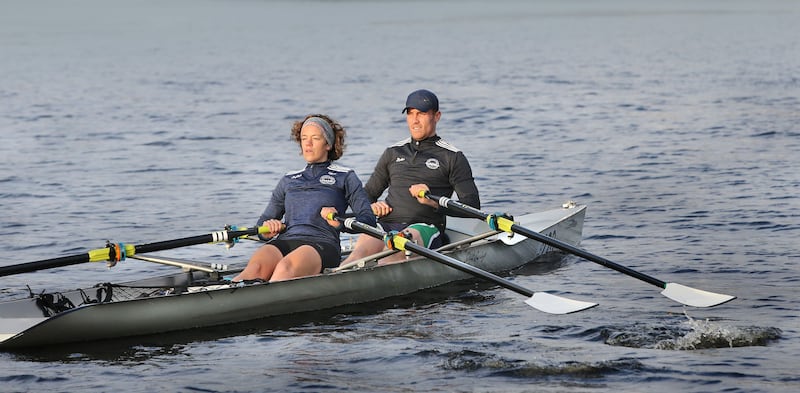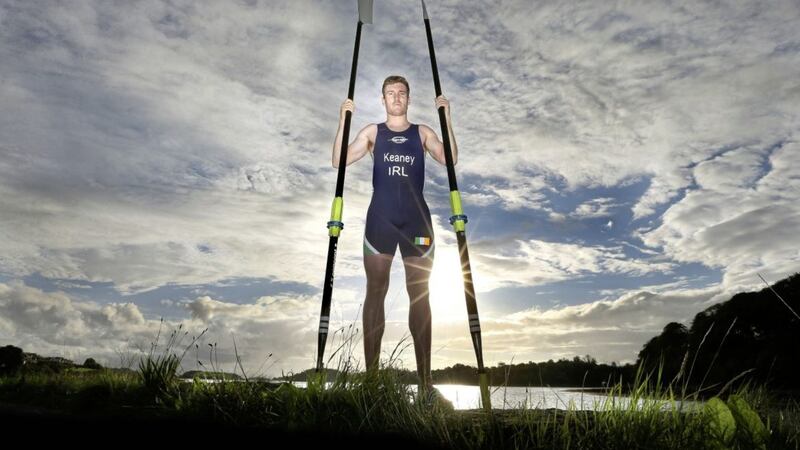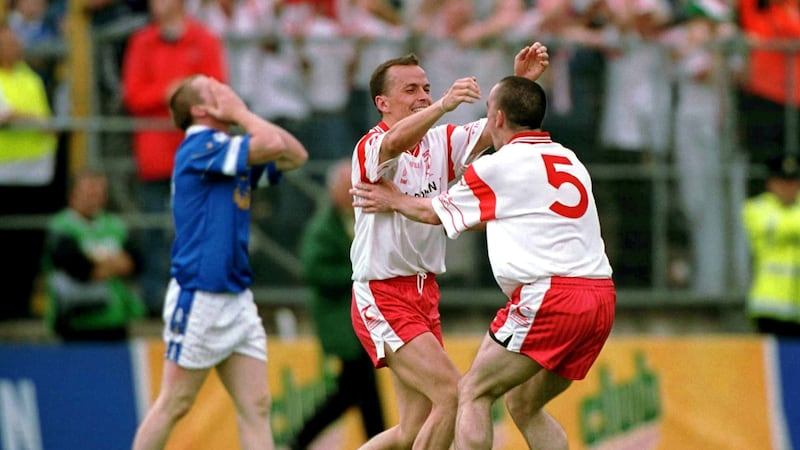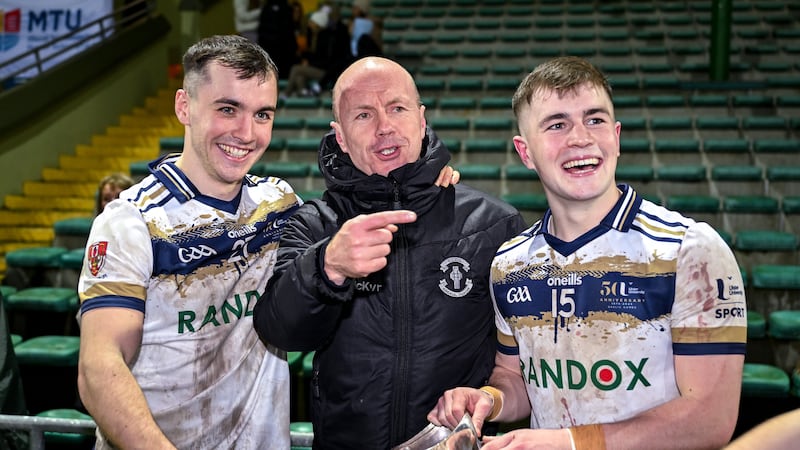THE butterflies will probably kick in when the last call for Lisbon echoes around the departure lounge on Wednesday morning. Like boarding the team bus on Championship day, there’s no going back then. It’s a feeling Luke Keaney knows well.
For the guts of a decade he dreamt of nothing but playing for Donegal. A part of development squads from 14, he could see the swell of talent coming through. With every session his hunger, his determination to succeed, intensified.
When Jim McGuinness arrived on the scene, everything changed. Any thoughts of a potential soccer career were parked instantly. Any decisions made outside of football were taken with Tir Chonaill in mind.
His grandfather, Tom ‘Pook’ Dillon, was a defender on the 1956 All-Ireland-winning Galway side. Keaney often imagined what it would be like for another generation of the clan to replicate that feat over half a century on.
Just 20 when a battle-hardened Donegal side scaled the summit in McGuinness’s second year, 2012 had come too soon for the Four Masters man. But the belief was always there, even in the face of the stiffest competition. By the following summer he was pushing hard for a start.
Watching as the age profile of that side crept upwards, the waiting game would be worth it in the long run. Nothing lasts forever - my time will come.
But it never did, the rug whipped from under him before he’d even had the chance to become a fixture. Before he’d got a proper run at it. Before he got near standing shoulder to shoulder with ‘Pook’ Dillon.
Four hip operations in the space of eight horrible months in 2017 anointed last rites on the dream. The final time he wore Donegal colours was as part of the panel at the 2014 All-Ireland final defeat to Kerry.
He last togged out for the club in 2016 but was only capable of going through the motions, a shadow of the player he knew he could be.
“It’s something I’m still coping with because that was my identity. That’s who I was - a Four Masters and Donegal footballer. And that’s all I wanted to do.
“Then all of a sudden everything you’ve worked towards your whole life has just been taken away. Everything you cared about, everything you wanted to be in life was no longer there.
“For 10 years you’re in that bubble and when that’s gone, there’s a grieving process you go through...”
Still only 29, he should still be there now as Declan Bonner surveys his options looking into 2022. Instead, life has thrown another curveball.
On Tuesday night he will crash at his aunt and uncle’s house in Dublin, the alarm already set to ensure he’s at the airport in good time for the following morning’s 6am flight. From Lisbon it’s 20 minutes west along the coast to Oeiras, the venue for this year’s World Rowing Coastal Championships.
Four years after fate so cruelly intervened, Luke Keaney is part of a team again - competing at elite level, this time representing country as well as county.
In the times when darkness descended he wondered how the void would ever be filled. Those days haven’t gone away, not totally. But the water and the will to reshape a broken future shone a light when he needed it most.
It’s good to be back.
********************************
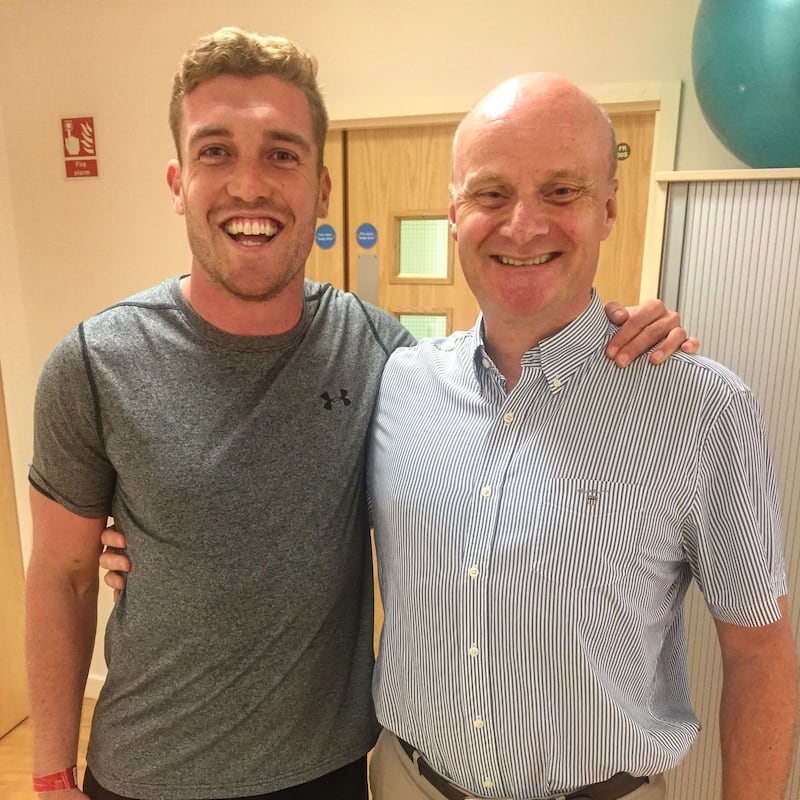
THERE’S plenty to love about life at the minute. A managing director with GID industrial, Keaney heads up the European wing of the Texas-based organisation from an office in Bundoran.
Time differences can have him on the job at strange hours, but remote working suits his new regime. There’s a gym nearby and, with the Donegal Bay rowing club less than half an hour away, he can train in the morning, head into the office, then be back on the water by evening.
Joining rowing partner Rosie Temple in the boat, they move out onto River Eske before the current takes them out four kilometres towards the Atlantic.
Having only come to the sport in the last two years, the aim is to eventually bring Keaney’s technical ability into line with his physical gifts. However, a place on the Irish team bound for Portugal - earned at the qualification event in Ballinskelligs back in July - shows how far he has come in such a short space of time.
Away from work and play he shares a house with Donegal footballers Hugh McFadden and Eoghan ‘Ban’ Gallagher. The odd time through the week cousins Ryan and Eoin McHugh will come over for a hand of cards.
This is where things could get tricky you suspect – talking hopes and dreams, leaving for training, walking out the door towards Championship combat. Everything he yearned for.
“Living with the two boys probably helps with own training, my own mindset.
“The week coming into games, obviously you’d miss the buzz around that, but over time I’ve kind of accepted that. I find it more difficult when I’m watching games. Like when they played Tyrone, and you’re in the stand … but you just support each other. It’s kinda nice because they switch off too and I know that they don’t want to talk about football either.
“The fact I’m training so much with the rowing, that’s taken the focus off.”
Instead, day to day difficulties lie elsewhere.
Rehabilitation from his annus horribilis forced a return to Donegal from Dublin in 2017 and, when mum Deirdre was diagnosed with breast cancer in January 2019, Keaney knew he would be sticking around a while longer.
Within nine months of her diagnosis, Deirdre was cancer-free, raising over €10,000 when running the Dublin marathon that October. Clearly resilience hadn’t far to travel along the family line.
Yet two years on, her eldest son is still in Donegal, unsure for how long.
“To be brutally honest, I do struggle with living here and being surrounded by all the football. When you’re out in public, meeting people around home, it’s opening up old wounds.
“People would still see you at matches and ask how come you’re not playing, because to look at me I’m as fit and as strong now as I ever was. If I was away, that would be a lot easier.”
To fully understand that pain, you have to understand the journey.
Playing senior championship with Four Masters from 16, Luke Keaney captained Donegal minor and vocational schools teams before progressing to the U21s in 2010. The following January, he made his senior county debut in a Dr McKenna Cup clash with Tyrone, on a day best remembered for reasons other than football.
“That was just after Michaela Harte had passed away, a freezing cold day. A frozen pitch in Edendork, and 10,000 people came out to support the Harte family.”
An 18-year-old Keaney spent the second half trailing Sean Cavanagh as Jim McGuinness tried and tinkered for the year ahead. Behind the scenes, the hard yards were mounting up.
Between the U21s and his commitments to club and UCD, 2012 was a year of heavy loading. The first time a hip issue surfaced came during a gruelling seven-match sequence over 28 days as the county championship was run off like a blitz in the wake of Donegal’s All-Ireland triumph.
That should have been a warning sign, but at the time he thought little of it.
“It didn’t feel like a massive red flag at the time but looking back now it was crazy.”
Playing U21 and Sigerson with UCD in the early part of 2013, Keaney was called into the panel for the National League, marking Diarmuid Connolly at a packed MacCumhaill Park. Three days later he played 65 minutes as Donegal fell to Cavan in the Ulster U21 final.
Despite that disappointment, he was getting closer to where he wanted to be.
“I was only 21 but even then I was wondering why I wasn’t getting more game-time. I felt I was as good as what was out there.
“Later that year when Mayo gave us a trouncing at Croke Park, myself, Odhran Mac Niallais and a few other younger lads were there, flying fit, in the shape of our lives, but we didn’t get our chance.
“Jim and Rory [Gallagher] went with the old guard, who weren’t quite at the level because they had boys carrying injuries. That didn’t sit easy with us young lads. You were wondering ‘what more do we need to do here?’”
McGuinness had just taken up a role with Scottish giants Celtic, and informed the panel this would be his final year at the helm. They resolved to go hell for leather to try and get Sam back.
Double weekend sessions became the norm throughout pre-season, so too the three hour round trip from Donegal town to Dunfanaghy. After the Sunday session it would be back to Belfast to prepare to play for Ulster University, having started a scholarship at Jordanstown.
Before that, it had been three-and-a-half hours on a bus to UCD’s Belfield campus, home at 2am, up seven hours later for lectures. Eventually, there would be a price to pay.
"That period did a lot of damage to me. It soon got to the stage where I was physically struggling to get out of the car. I could hardly even put on my socks myself.
“And still, with it all, I was playing my best football. We got to the Sigerson final, I won a Sigerson Allstar. We went out to a training camp in Portugal with Donegal and my confidence was sky high…”
Keaney started the Division Two final against Monaghan and came off the bench in Ulster Championship wins over Derry and Antrim as the Tir Chonaill claimed the Anglo-Celt once more.
However, the introduction of Ryan McHugh aside, McGuinness stuck largely with his loyal lieutenants en route to another All-Ireland final. Keaney, though, remained upbeat.
“The way I saw it, although I wasn’t playing a lot, I still had an Ulster medal, we’d just been beaten in an All-Ireland final - I’ve 10 years of this ahead of me. This is only the start.”
But not just yet. A career move took him to Texas for most of 2015, ruling him out of contention in Gallagher’s first year in sole control. While Stateside, Keaney played a bit of Aussie Rules, impressing enough to be asked to attend an AFL combine, but his hips were getting worse.
A cracked collarbone sustained playing in a relegation play-off with Four Masters didn’t help and by the time Gallagher asked him to rejoin the county set-up in 2016, his body was creaking.
“Even from a walking point of view, I was carrying my right leg. I wasn’t fit to finish club games.
“I was getting through games without actually influencing them. I couldn’t really run or kick with my right side.”
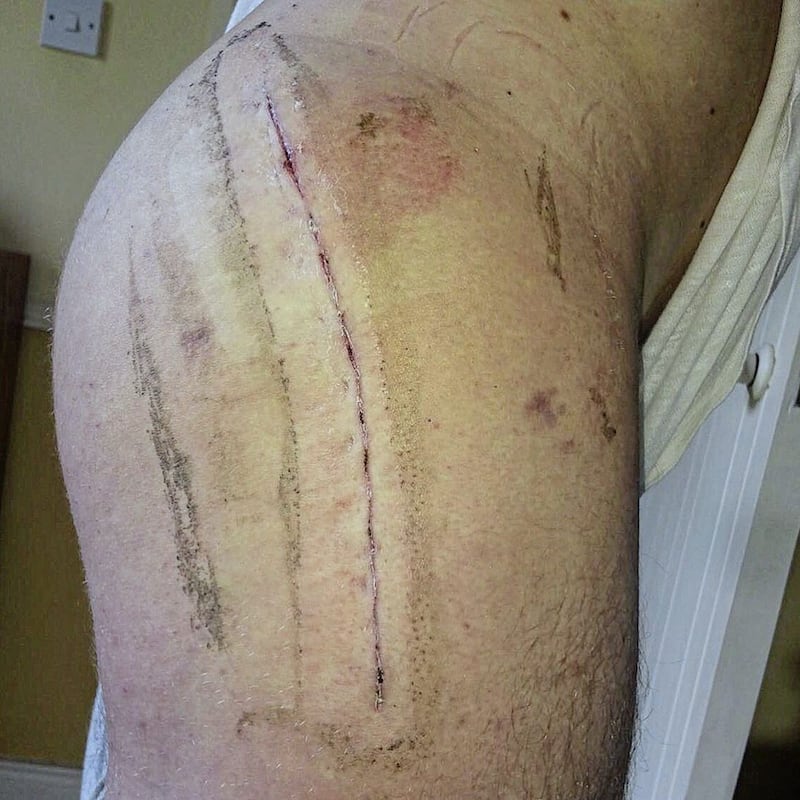
That Christmas, MRIs of both hips were sent to orthopedic surgeon, Professor Damian Griffin. When Keaney travelled to Coventry for a consultation weeks later, he did so with hope in his heart.
“In my head it was going to be a case of a quick operation, worst case scenario I’ll be back for National League. I still believed I was going to be centre half-back for Donegal in that year’s Championship.
“Little did I know I was never going to pull on the jersey again.”
The first 3D image showed the extent of the degeneration around the right hip in particular. Keyhole surgery was scheduled for February but when a planned three hour operation was over inside half an hour, the writing was on the wall.
“That was when my whole world came crashing down.
“I was sitting in that room hoping to get good news, then all of a sudden you’re told your career’s over… I just broke down. He told me my hip was the equivalent of a 70-year-olds, that I was never going to play at elite level, and that we have to think of your quality of life in your 60s and 70s.
“Like, you’re 24 and somebody’s talking to you about your quality of life when you’re 70? Even thinking back now, it’s hard to put into words because you’re just so distraught.”
The removal of three trochanteric screws in June 2018 was the last time he had to go under the knife. Republic of Ireland captain Seamus Coleman was among those to send messages of support.
Yet while the physical scars healed in time, the mental baggage proved harder to shift.
“Aww Jesus, there’s still days you’d be crying.
“I struggle even to go out and watch the club play at times. I became a very angry person… it got very dark because I didn’t know how to deal with that. I was so driven and so focused, but then for me to have no control… there was so much anger, so much resentment, so much hatred over why this would happen to me.
“Even away from the football, I had to move home. I couldn’t walk for seven weeks, I needed people to help me get dressed, to help me get showered.
“After I got back walking I moved back into the apartment, my family had to get on with their lives, and then the isolation kicks in. You’re on your own, I couldn’t sleep, I was on morphine, I wasn’t fit to work… the only person who could get me out of that was myself.
“But there was a lot of dark days, a lot of tears.”
The Gaelic Players’ Association put him in touch with counsellors to help share the load. He still speaks to them now when anger and frustration resurface.
“You blame everything at different times.
“You blame football, the lack of knowledge, you even blame yourself - maybe you should’ve spoken up sooner and it might have got to the stage where a keyhole would’ve fixed the problem and saved your career.
“All those ‘what ifs’ would be constantly running through your head. There’ll probably always be that sour taste because you’ll never know what kind of footballer you’d have become.”
********************************
FOR every moment of angst, though, there is also a growing understanding that we all move to life’s rhythm, not the other way around. Sharing his experiences helps too.
Next year he has been asked to tell his story at FIFA’s Isokinetic conference, which will also feature the likes of Steven Gerrard and Marco van Basten, alongside a host of medical experts.
In 2020 he spoke with Des Ryan, the former head of sports medicine and athletic development at Arsenal's academy. The Galway man is also a key member of the GAA’s sports science working group, who are looking at ways to limit the load on players trying to serve too many masters.
“You have parents out there trying to do their best but they don’t know what they’re doing to kids’ bodies,” says Keaney.
“Then there’s managers who aren’t held accountable. They’re getting paid to come in and look after a team but they’re not looking two or three years down the line, it’s all about the here and now.
“And county boards aren’t stopping them. They’re not saying ‘no you can’t train this way’.”
Rowing offered him a way back into sport. Rehab sessions at the Central Hotel led to a chance meeting with Donegal Bay coach Patrick Brady and the rest, as they say, is history.
Last year, alongside Paddy McGlynn and Rosie Temple, Keaney won gold at the Irish championships. Then came the Europeans, going head to head with athletes who would feature at the summer’s Olympic Games in Tokyo.
In Oeiras on Friday, Keaney and Temple will compete in the beach sprints, before the 6km event the following Thursday. What was a pastime has now become serious business.
After the hell of the past four years, he wouldn’t have it any other way.
“It’s the first time I’ve actually felt had that bit of competitive edge since football.
“It just shows, no matter what life throws at you, no matter what hurdles you have to overcome, you can carve out your own path. All those dark days, the suffering… I’m not saying I’m over all that, but now I’m at the top of rowing, despite all those setbacks.
“From an identity point of view, I’m no longer the Donegal footballer, I’m a rower. Even just saying that gives you a wee buzz. You’re saying to guys ‘aw yeah, just heading off to the World Championships here, representing Ireland’.
“It’s been a long road, but I’m extremely proud of that.”
